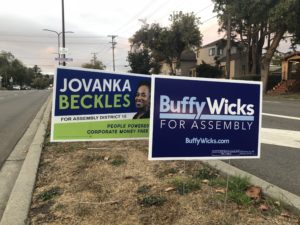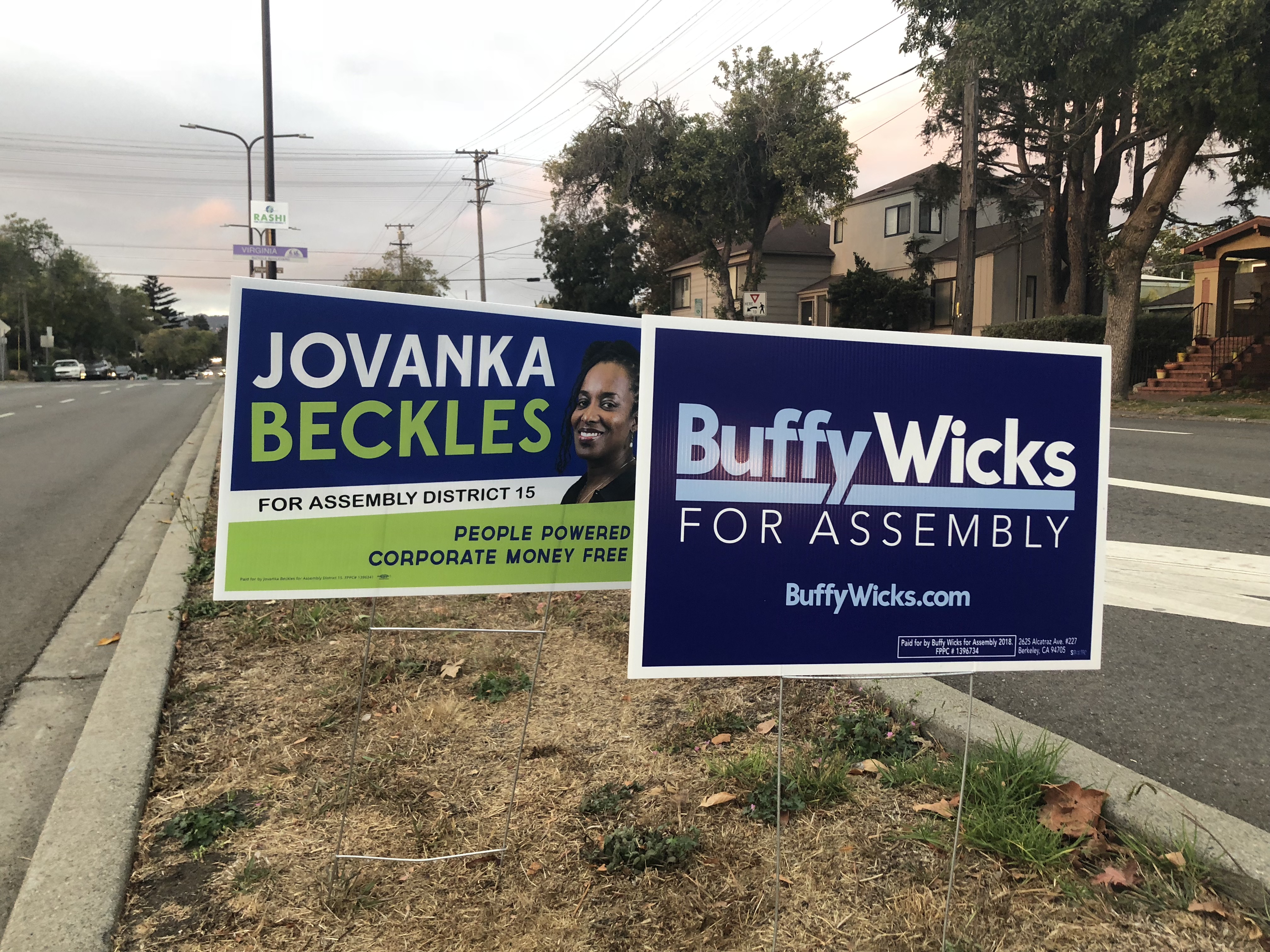When compared to the candidates battling in polarized partisan races across the country, Assembly District 15 candidates Jovanka Beckles and Buffy Wicks, both Democrats, may seem indistinguishable in their political positions. Both candidates for the district— which encompasses Berkeley, part of Oakland, Richmond, El Cerrito, and other parts of Alameda and Contra Costa County— tout their grassroots organizing and opposition to corporate campaign donations. They even have the same key objectives in their platforms: increasing affordable housing in the district, improving the public education system, and ensuring universal access to health care.
Despite ideological similarities, the candidates have distinguished themselves based on subtle policy differences, qualifications, and character, which has created a competitive—even polarized— assembly race.
Buffy Wicks grew up in Placer, a rural county in Northern California. After attending public high school, community college, and eventually graduating from the University of Washington, she started her career organizing Iraq War protests in the early 2000s. Since then, she has worked for a multitude of presidential campaigns, including Howard Dean’s in 2004, Barack Obama’s in 2008 and 2012, and Hillary Clinton’s in 2016. She also worked in Obama’s Office of Public Engagement for six years and is partially credited for designing the administration’s grassroots organizing strategy. She also rallied support for the Affordable Care Act.
In the eyes of her supporters, Wicks’ extensive experience in grassroots organizing illustrates her connection to the people.
“[When] you’ve had the opportunity to do grassroots movement building, you really have a good sense of people and what they need,” Rebecca Levenson, a Berkeley local and Wicks supporter, said.
Wicks’ backers believe that her experience working on public policy under the Obama Administration makes her uniquely prepared to turn progressive ambitions into concrete policies.
“[Wicks is] extremely progressive, and also very pragmatic,” Lillian Patil, a policy advisor for the Wicks campaign, said. “Buffy thinks about [policies] in a thoughtful way that I have not seen in a politician in a very long time… I know she has the experience it takes to fight these hard fights and… turn bold ideas into real, lasting, equitable change.”
National political leaders like former President Barack Obama and Senator Kamala Harris, as well as local leaders like the mayors of Oakland, Richmond, El Cerrito, and Albany, have endorsed Wicks.
Jovanka Beckles, though comparatively uninvolved in national politics, has worked in the Bay Area community for almost thirty years.
Beckles emigrated from Panama as a child. She graduated from Florida A&M University and went on to earn a Master’s of Business Administration from the University of Phoenix. Since moving to the Bay Area in 1989, Beckles has worked as a youth educator, housing case manager for the homeless, mental health specialist, and has been a Richmond City Councilor since 2010. As a city councilor, Beckles helped to pass major rent control bills, a $15 citywide minimum wage, and the “Ban the Box” initiative, a bill that eliminated the requirement to state previous convictions on job and housing applications.
A queer, Black woman and Latina immigrant, Beckles has spoken passionately about how her election would increase political representation for people of marginalized identities. She argues, “the way that we turn … injustice around is by… supporting disenfranchised people to be able to be in a position of power, and to make a significant change to the status quo.”

Beckles is also a leader of the Richmond Progressive Alliance, a community group of activists and local politicians that pushes for progressive policies in the Richmond area. She’s been endorsed by Our Revolution, a political organization modeled after Bernie Sanders’ 2016 campaign, that supports community leaders that share their progressive mission— especially regarding keeping money out of politics.
While a connection to Sanders may increase her popularity among a particular demographic of voters in the progressive East Bay, some residents take issue with Beckles’ voting record. In 2016, she voted for the Green Party’s Jill Stein instead of Democratic candidate Hillary Clinton.
“You have to show up to vote,” said Levenson, implying that voting for Stein was equivalent to not voting at all. “If you don’t show up to vote, I don’t really care what your politics are, you don’t have a voice.”
On her website, Beckles states that her vote was meant to protest “dissatisfaction with the leadership of the Democratic Party,” and the notion that her vote helped Trump win is “silly,” considering she voted in California.
Nevertheless, Beckles’ vote for Stein contributes to her image as an anti-establishment Democrat, in contrast with Wicks, who may be seen as more of an establishment candidate considering she worked for Clinton, Obama, and Dean.
But more than anything related to national politics, Beckles touts her long-term commitment to the local community as one of her most important and unique qualifications for state assembly.
“[Wicks] just moved here two years ago. I’ve been living in the Bay Area for 30 years,” Beckles said. “I have roots here, she doesn’t.”
Her supporters seem to agree. “We need people in Sacramento who are going to represent people here in our community,” Kacey Carpenter, one of Beckles’ canvassers who also works with Our Revolution, explained. Carpenter praises Beckles’ experience as a local city councilor, especially, saying that, “she’s got credibility… Beckles has been here in the community, she’s local, she has experience, but this is Buffy’s first race to be in office. So Jovanka has that experience, and Buffy does not.”
Wicks, to compensate for her limited experience in the area, has made local outreach a centerpiece of her campaign. The Wicks campaign has held more than 190 house parties, where her supporters hold gatherings for people in the neighborhood. Wicks attends these parties and talks with constituents about their concerns and desires for the district.
“Because of the house parties, a lot of people know who she is personally,” Rachel Pierce, a Berkeley High School student and intern for Wicks, explained.
“She resonates with local voters because all of her policies, all of her ideas and campaign, come from the voters, come from her grassroots organizing, come from her now more than 190 house parties that she’s had up and down the district. Her policies come from listening,” said Patil, her policy advisor.
Wicks’ outreach in the community won her the most votes in every city in the district during the primary, even Richmond, Beckles’ home city.
But Wicks’ local outreach still has not satisfied some, largely because Wicks is not only a relative outsider herself, but because a lot of her campaign donations come from outside the district. Only about one in seven of Wicks’ campaign donors have zip codes within District 15, compared to about two-thirds of Beckles’ donors, according to the Berkeley Daily Planet. KQED estimated that in 2017, less than a tenth of Wickles’ total campaign contributions came from within the district.
Even more concerning to some are the donors supporting Wicks’ campaign. Though Wicks has not evidently received campaign donations from corporations themselves— contrary to what some of Beckles’ supporters have suggested— groups of employees from companies like LinkedIn or the private equity firm Sutter Hill Ventures have donated thousands of dollars to her campaign. Affluent individuals like environmentalist Tom Steyer and several members of the prominent Fisher family have made the maximum individual contributions to Wicks’ campaign.
Beckles’ biggest donors are the California Federation of Teachers, a statewide organization of local teachers unions, and the Service Employees International Union, one of the largest workers unions in the country.
The de facto slogans on her website and advertisements are “People Powered, Corporate Free,” and “People Over Profit.” “She doesn’t take any money from the special interest groups,” Carpenter praises.
It is essential to note that unions are still special interest groups; they donate money to candidates whom they believe will progress the groups’ interests if elected. However, most progressive voters likely do not view unions with much skepticism, usually assuming that the interests of unions (and their workers) align with their progressive values.
In the process of touting the progressive values of her own donors, Beckles seems to exaggerate the conservativeness of Wicks’ benefactors.
“The majority of my donations come from individuals who are invested in this community,” Beckles asserted. “The majority of her [Wicks’] donations, whether it’s directly or indirectly through independent expenditures, come from the same billionaires who are donating to Republicans… who are trying to destroy unions…who are trying to privatize prison and our school system.”
There is no evidence to suggest that the majority of Wicks’ donations come even indirectly from millionaires and billionaires who are supporting Republicans, trying to destroy unions, or privatize prisons and schools.
However, it is true that Wicks’ largest donor, Govern for California, has an anti-union leader and conservative leanings.
David Crane, a tech investor and former advisor to Arnold Schwarzenegger, leads Govern for California, a network of political philanthropists which he co-founded with Walmart Chairman Gregory Penner and fellow tech investor Ron Conway. Govern for California has been known to back pro-charter school candidates, and Crane, its leader, often criticizes teachers and other public unions for demanding wages that put an undue burden on taxpayers. While Govern for California has no explicit political agenda, they have often been labeled as pro-charter school, anti-union, and thus a right-leaning organization.
However, as Wicks argued when talking to the East Bay Express, “Govern for California has donated to many progressive champions across the state,” including State Senators Nancy Skinner and Scott Wiener, and Assembly member David Chiu. Govern for California donated only a few thousand dollars to each candidate, while they donated two hundred thousand dollars to Wicks.
When asked about the PAC’s contributions to Wicks’ campaign, Andrew Crutchfield, political director of Govern for California, told the East Bay Express that their organization believes that “Buffy is the right candidate to move our state forward on important issues such as education and the housing affordability crisis.”
Wicks’ record is not conservative on either of those issues nor on the matter of unions. While working for the Center for American Progress in 2013, she collaborated with the SEIU to launch the Women’s Economic Agenda, an initiative to increase awareness and drive public-policy about women’s issues. Earlier in her career, Wicks worked for the United Food and Commercial Workers Union to demand higher wages and better healthcare for Walmart employees.
On the issue of education— specifically charter schools, which Govern for California seemingly supports— Wicks’ stance is less hardline than that of her opponent. One of Beckles’ main objectives, in addition to increasing regulations on the schools, is to initiate a complete moratorium on new charter schools. “The lifeblood of the public schools is just being drained… the more students that leave our public school system, the less resources that it gets,” emphasized Beckles.
Beckles’ platform states, “charter schools have generally undermined public school quality, failed to provide better education, harmed education worker unions, and worsened working conditions and dignity for teachers.”
Wicks, in contrast, has promised to carefully monitor charter schools but not ditch them altogether. “We should meet students where they are … through traditional public schools, public charter schools, community colleges, as well as our CSUs and UCs,” Wicks wrote in a questionnaire provided to voters during a February debate. On her platform, Wicks writes that she does want to ban for-profit charter schools, unionize teachers in all charter schools, update regulations, and make it easier to identify and shut down under-performing charter schools.
Levenson agrees with Wicks’ position. “I hate charter schools, and I think they’ve taken a huge amount away from public schools,” said Levenson. “But I also know stories of charter schools that were incredibly and profoundly important to communities, and I don’t get to make that decision for you.”
The fact that Wicks is less anti-charter schools than Beckles is perhaps one of the reasons she has received money from Govern for California. Ultimately, Wicks insists that she is in favor of drastic reforms for charter schools and that she is a firm believer in public education and wants to pass legislation providing free college for all.
The other issue that Govern for California acknowledged as one of their primary reasons for supporting Wicks is her stance on the affordable housing crisis, one of the only other issues for which the candidates have distinguishable policy positions. Wicks is focused on helping the poor above all else, but because of her commitment to new housing for all income levels, her policy propositions would benefit the middle and upper classes more than those of Beckles.
On her website, Wicks states that “building more homes at all income levels — low income and market rate — will ease the pressure cooker nature of our market and get Bay Area people into the homes they need.” Wicks’ supporters agree with her. “We live in a mixed place,” said Levenson, a Berkeley resident. “I want mixed housing, because we all live here. And it needs to be all of us. …When we invest in mixed housing, we do a little bit better around meeting everybody’s needs. It’s the right thing in terms of building healthy communities.”

photo courtesy of Lucy Barnum
Beckles maintains that directing resources solely to low-income housing is the best way to help victims of gentrification in the East Bay.
62% of low income households live at risk of displacement, or have already been displaced by exclusion or gentrification, according to a study conducted by UC Berkeley and the San Francisco’s Mayor’s Office of Housing and Community Development.
“There are so many people who are homeless, who are working 40 hours a week,” says Beckles. “We have to have affordable housing, because the for-profit housing system is not working.”
Beckles is an advocate for Proposition 10, a statewide motion that would repeal a current law, Costa Hawkins, that currently limits rent control across California. If Prop 10 is passed, rent control laws will move down to a local level. Consequently, cities with higher gentrification rates will be able to pass stricter laws without state interference. While Beckles has firmly stated her support for Prop 10, citing that the bill will especially benefit low-income communities of color, Wicks wants Costa Hawkins reformed rather than completely repealed.
Their opinions on housing reflect a pattern in the candidates’ core differences: Beckles’ policies are directed more specifically toward the lower working class, who she describes as “under attack,” while Wicks’ platform— though still supporting the working class— also tends to residents in more upscale areas.
Despite the theoretical disconnect between socioeconomic classes, Wicks still seems to be faring well across the entire district. As aforementioned, in the June primaries, she won every city in the district. However, Wicks’ campaign knows that they still need to bridge the gap between the generally higher-class Alameda County and the less affluent Contra Costa County.
On September 8, 2018, the Wicks campaign opened a new office in Contra Costa County, near the Richmond and El Cerrito border. “I’m excited that this new headquarters has allowed us to get to know this community in El Cerrito and in Richmond on a deeper level,” says Patil.
Beckles takes pride in her Richmond roots, claiming that her status as a district native, and love for its community, indicates that she will serve its residents well. “I love this city. I love this district,” she said. “If you don’t love the people, then you’re going to betray the people. And I will not ever do that. Never have, never will.”
Beckles presents herself to be “for the people,” and voters see this as a genuine sign that “she’s running for all of us in the community,” Carpenter notes. Due to her local experience on City Council, her progressive platform seems to resonate more deeply in northern parts of Contra Costa County and District 15.
But in other, more affluent places such as Berkeley, her policies on issues like housing may miss the mark, with Wicks supporters like Leverson insisting that they want more housing for all income levels. Beckles also does not carry the same name-recognition and familiarity in the southern parts of AD-15 that she does in the northern parts, a familiarity that Wicks may be achieving through house-parties and other local outreach.
To some degree, Beckles and Wicks reflect the larger divide in the Democratic Party today.
Across the country, voters have been choosing between so-called “establishment” Democrats with more high-profile experience in national politics, and more radical progressives, with perhaps lower-name recognition but usually bolder, more progressive promises.
Of course, Wicks and Beckles are both incredibly progressive— promising big changes like free college and universal health care— so it is only their past experience and subtle policy and campaign differences that distinguish them.
Ultimately, both campaigns see their candidates as the progressive champion who will bring the brightest future for the Democratic party.
“[Wicks has been] able to recognize that there’s all kinds of ways you can help in the world,” said Levenson. “I swear, if Buffy was in the position that Hillary [Clinton] was in, she would have won.”
“My vision of the future… is that you have more people like me who are putting the needs of the people, who are building a California that works for all of us, ” says Beckles, “…And so my vision is that we turn this party around by electing corporate-free, people-first candidates that actually start to do the work for the people.”






